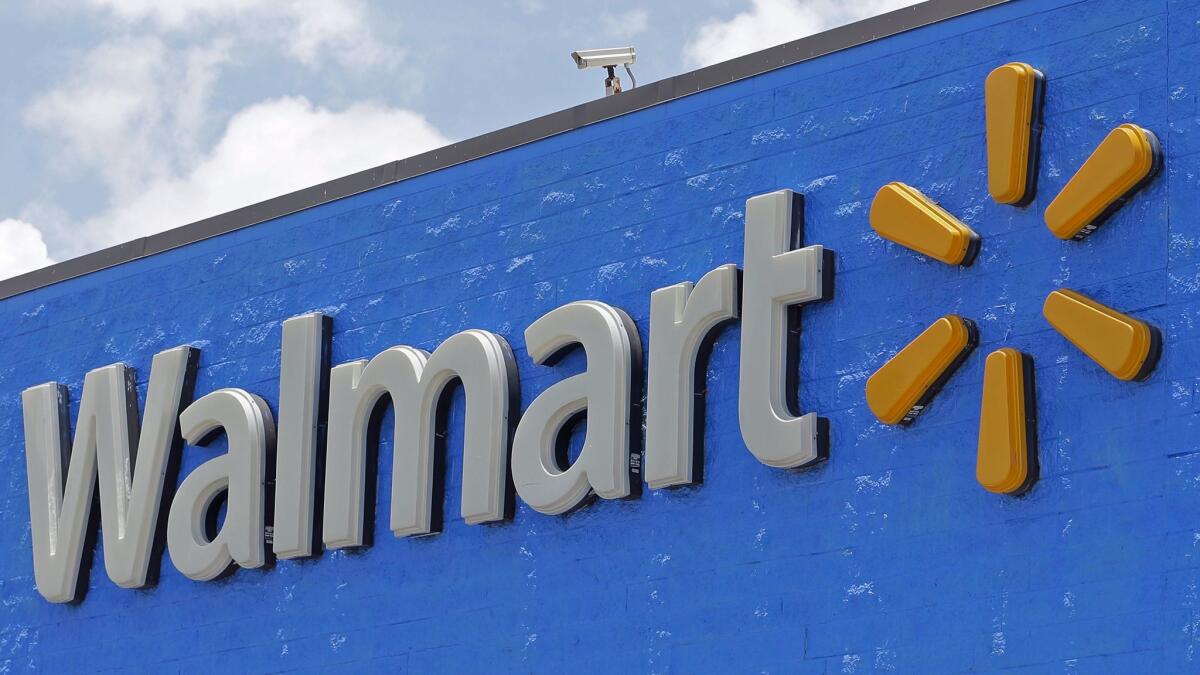Walmart is developing a membership program to rival Amazon Prime

- Share via
Walmart Inc. is opening a new front in its war with Amazon.com Inc.
The world’s largest retailer is developing a paid membership program to challenge the internet giant’s Prime offering, which is the default online shopping option for its 150 million or so paying members worldwide.
The service, called Walmart+, will expand on the retailer’s grocery-delivery subscription service, which it introduced last year. Chief Customer Officer Janey Whiteside will spearhead the service’s development and rollout.
A Walmart spokeswoman confirmed the plans but declined to provide any details. Additional perks could include discounts on prescription drugs and fuel, according to Recode, which first reported the existence of the program.
Developing a broad-based membership program illustrates Walmart’s deep-seated concern that shoppers who defect to Amazon often don’t come back. The idea also runs counter to the ethos of founder Sam Walton, who famously refused to introduce the shopper-loyalty programs that are now common at U.S. retailers. He argued that Walmart needed to treat each and every customer the same.
Still, Walmart has tried to mimic Prime before, testing a program called ShippingPass that it ended in 2017 upon the arrival of Marc Lore, who now runs Walmart’s U.S. e-commerce business.
The latest move is more ambitious than previous efforts and aims to counter Amazon’s hold on the loyal shoppers who pay for the perks associated with Prime, which include free shipping and video streaming. Prime members spend about twice as much at Amazon as other customers, and their willingness to splurge is a big reason Amazon captured an estimated 40% of all sales growth in the U.S. retail sector in the holiday quarter.
Since its debut in 2005, Prime has helped Amazon compete on price with physical retailers, enabling the company to grow from an online bookseller into the largest online merchant of a wide range of goods. The company has tried to keep Prime members, who pay $119 a year for the service in the U.S., hooked with goodies such streaming video and music and, more recently, grocery delivery.
Amazon has also taken steps to attract lower-income shoppers to Prime memberships by offering monthly membership rates rather than requiring members to pay annually. Like Walmart, it is also delivering groceries to food-stamp recipients. Such efforts show Amazon is looking to broaden its customer base from affluent shoppers craving convenience and make Prime membership an everyday necessity.
Whiteside, the Briton who’s heading Walmart+, has become a powerful player at Walmart since her arrival from American Express in 2018. Chief Executive Doug McMillon has tasked her with courting more upscale shoppers and merging online and brick-and-mortar operations so that customers have a similar experience no matter where or how they shop. She also has created a product team, which is using technology to improve the customer experience.
Using Walmart’s existing grocery delivery service as the backbone of Walmart+ makes sense: It’s the one business in which Walmart has a clear advantage over Amazon, with more than 20% market share in the $800-billion category. Walmart already delivers groceries from more than 1,600 U.S. stores and is testing a service that sends employees right into customers’ homes to put the food away in their refrigerators.
Walmart’s Delivery Unlimited service currently costs $98 a year or $12.95 a month, and it uses a free 15-day trial to entice new members. Customers can also pay a per-delivery fee with no membership.
More to Read
Inside the business of entertainment
The Wide Shot brings you news, analysis and insights on everything from streaming wars to production — and what it all means for the future.
You may occasionally receive promotional content from the Los Angeles Times.










